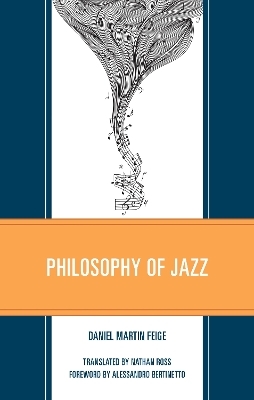
Philosophy of Jazz
Seiten
2024
Lexington Books/Fortress Academic (Verlag)
978-1-6669-5950-5 (ISBN)
Lexington Books/Fortress Academic (Verlag)
978-1-6669-5950-5 (ISBN)
Philosophy of Jazz discusses the philosophical relevance of jazz, showing that jazz and European art music have more in common than many assume.
What is jazz? How does it differ from other kinds of music? To what extent is it an important subject for thinking about aesthetic questions? Philosophy of Jazz is among the first book-length philosophical discussions devoted to jazz. Daniel Martin Feige explores the relationship between jazz and European art music, arguing that in jazz central aspects of musical practice are made explicit, aspects that remain implicit in the tradition of European art music but nevertheless inform their practice. He develops the idea that interpretations of works and improvisations share a central common feature: It is the musical performance that clarifies the meaning of the music. A musical performance acquires its identity against the background of a tradition of performances, and as embodied tradition, improvisations as well as interpretations are part of an ongoing musical as well as historical dialogue. Using jazz to expand the vocabulary of art theory, this book reflects on how philosophy should take up objects of cultural and aesthetic concern.
What is jazz? How does it differ from other kinds of music? To what extent is it an important subject for thinking about aesthetic questions? Philosophy of Jazz is among the first book-length philosophical discussions devoted to jazz. Daniel Martin Feige explores the relationship between jazz and European art music, arguing that in jazz central aspects of musical practice are made explicit, aspects that remain implicit in the tradition of European art music but nevertheless inform their practice. He develops the idea that interpretations of works and improvisations share a central common feature: It is the musical performance that clarifies the meaning of the music. A musical performance acquires its identity against the background of a tradition of performances, and as embodied tradition, improvisations as well as interpretations are part of an ongoing musical as well as historical dialogue. Using jazz to expand the vocabulary of art theory, this book reflects on how philosophy should take up objects of cultural and aesthetic concern.
Daniel Martin Feige is professor of philosophy at the Stuttgart State Academy of Art and Design. Nathan Ross teaches philosophy at Adelphi University in New York.
Foreword by Alessandro Bertinetto
Introduction: What Is a Philosophy of Jazz?
Chapter 1: Jazz and the Tradition of European Art Music
Chapter 2: The Musical Work and Improvisation
Chapter 3: Musicians and Musical Tradition
Conclusion: The Philosophical Relevance of Jazz
Bibliography
About the Author
| Erscheinungsdatum | 21.08.2024 |
|---|---|
| Übersetzer | Nathan Ross |
| Vorwort | Alessandro Bertinetto |
| Sprache | englisch |
| Maße | 159 x 237 mm |
| Gewicht | 349 g |
| Themenwelt | Kunst / Musik / Theater ► Musik ► Jazz / Blues |
| Kunst / Musik / Theater ► Musik ► Musiktheorie / Musiklehre | |
| Geisteswissenschaften ► Philosophie | |
| ISBN-10 | 1-6669-5950-2 / 1666959502 |
| ISBN-13 | 978-1-6669-5950-5 / 9781666959505 |
| Zustand | Neuware |
| Haben Sie eine Frage zum Produkt? |
Mehr entdecken
aus dem Bereich
aus dem Bereich
zur politischen Ästhetik des Jazz
Buch | Hardcover (2023)
Phillip Reclam (Verlag)
38,00 €
Die Geschichte des Jazz in Deutschland
Buch | Softcover (2021)
Reclam, Philipp (Verlag)
20,00 €


